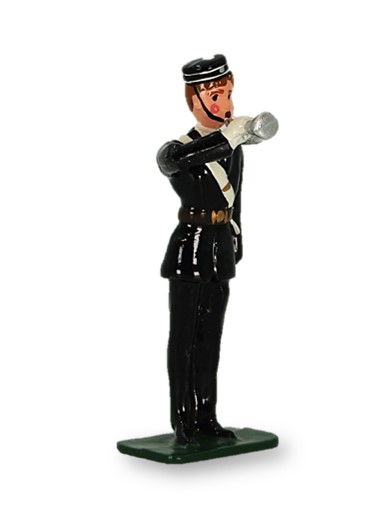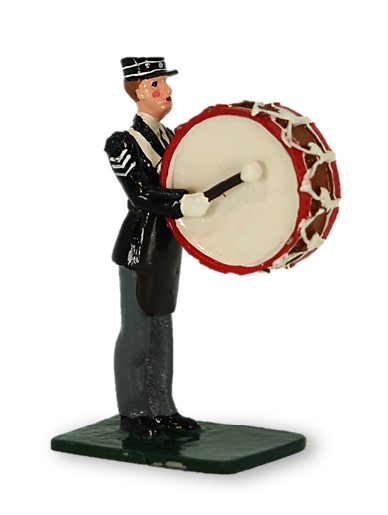1886 – First Camp Of The Glasgow Company
Overview
During the Fair Holiday in July 1886, the 1st Glasgow Company held the first camp. Designed to keep the Company in contact with its members during the summer months, the week away at Tighnabruaich on the Kyles of Bute saw Boys enjoy expeditions by boats, games, and rambling in the hills.
Camping became an important part of Boys’ Brigade activities, with all the major anniversaries being celebrated with a Camp, including the centenary of Camping, which was celebrated with a Camp in 1986 at Ayr, and included a trip to Tighnabruaich, and the unveiling of a cairn to mark the occasion.
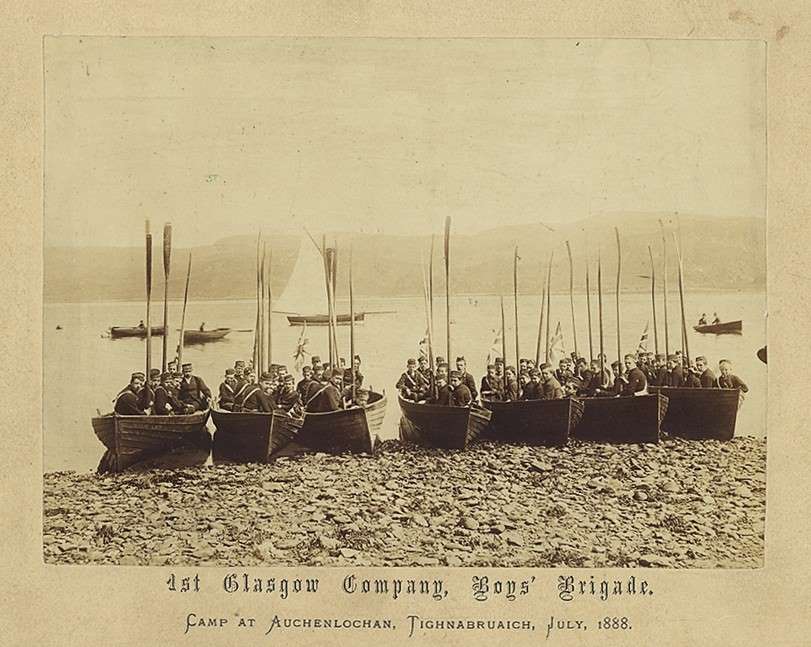
An Account of the first camp, written by William Smith – published April 1886.
No more delightful holiday was ever enjoyed by boys than the week spent at Tighnabruaich, in the Kyles of Bute, by the 1st Glasgow Company of The Boys’ Brigade, and never did the advantage of the military element in the Brigade shine out more conspicuously. The Company was under the command of Mr Wm A. Smith, Captain, assisted by Messrs J. R. Hill, J. B. Hill and J. Dalzlel, Lieutenants, while Mr G. St Glair Jones was in charge of the band.
The departure from Glasgow on Friday morning, 16th July, was by the steamer Columba, and on arriving at Tighnabruaich the Company marched straight to the fine public hall at Auchenlochan, which was to be their home for this memorable week. The first day was spent mostly in putting the camp Into order, all the heavy luggage having been sent down the day before. The seats were first cleared out of the hall and then the canvas beds, stuffed with straw, were arranged all round the two sides and the end, divided into six ‘squads’ of about eight each. Except when in use, these beds were folded up three-fold, and on the top of each bed was placed the folded blanket and kit-bag, while the rifle was placed against the wall. In the centre of the hall were six tables, one for each squad. In the corner next to the platform was the camp library, with a good selection of books borrowed from the Sunday School library, the daily newspapers and a number of Indoor games. Here also was the camp post office, where boys could post letters to their friends and where letters received in camp were stuck up until claimed. The post office orderly took the letters twice a day to the mail steamers; and very nice it was at times to see numbers of boys sitting writing home and then posting their letters with as much confidence as if they were putting them into the general post office.
The platform was marked off as ‘officers’ quarters’ and was reserved for this purpose. The hall was tastefully decorated with flags, ferns and flowers. Ample accommodation for washing and dressing was afforded in the side rooms off the corridor, where each boy had a pin with his own number on which to hang his towel. The camp kitchen also opened off this corridor, and here all the stores were kept and all the cooking done.
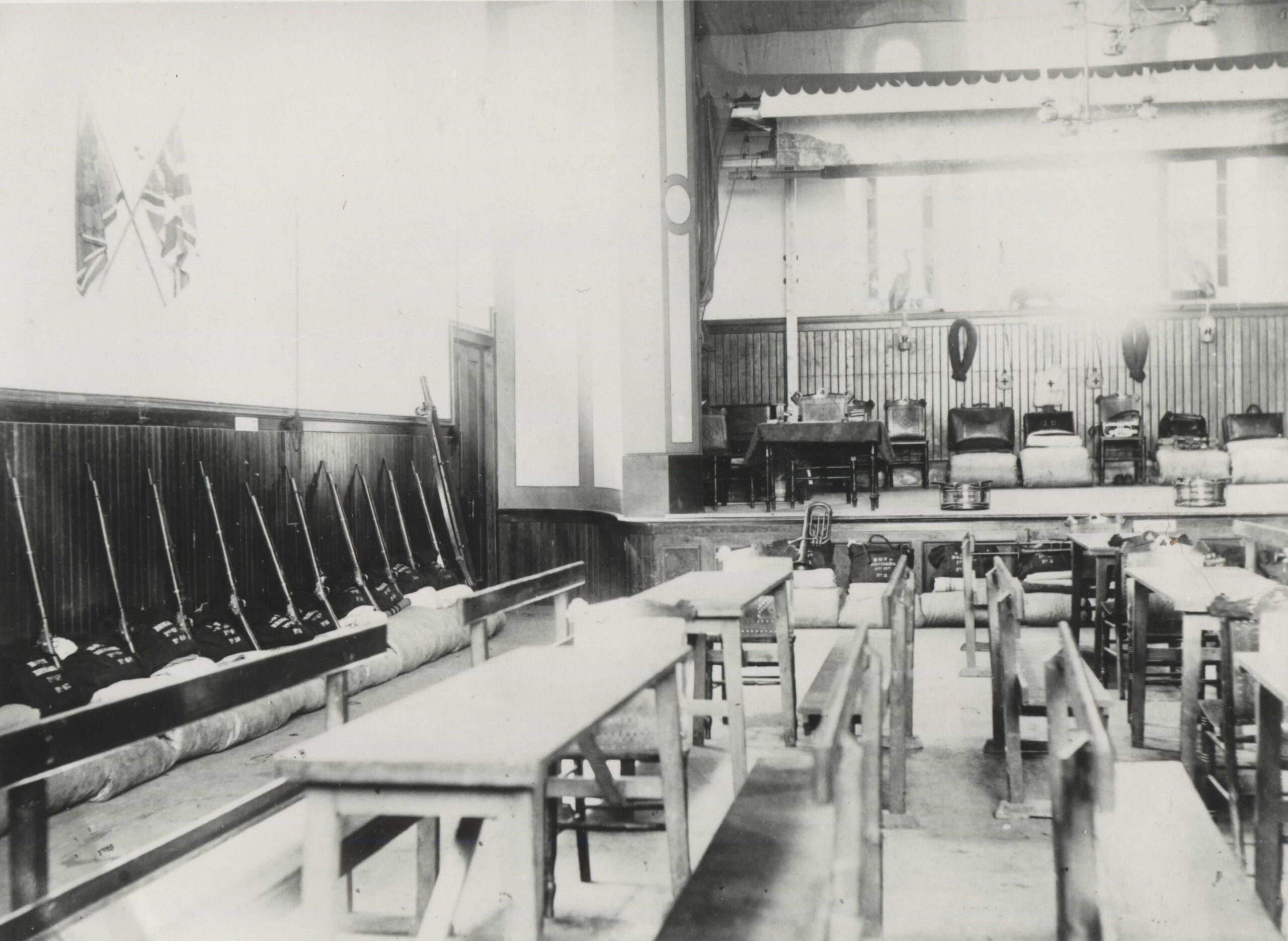
Saturday was a lovely day, and in the afternoon the band had the pleasure of performing at a bazaar being held In aid of the local Free Church, where band and Company were accorded a most hearty reception. Indeed nothing could have been more cordial than the interest shown In the Company by Rev. Mr Young, the Free Church Minister, and Rev. M M’Fle, the Established Church Minister, and the members of their congregations. On Sunday the Company went to the Established Church for the Morning Service when Rev Mr M’Fle preached to a crowded congregation, and special seats were set apart for the boys. In the evening a very interesting Service, under the direct auspices of the Company, was held In the Free Church which was filled to the door. Rev. Mr Young presided and the meeting was addressed by Dr Thomas Morrison, Mr Macdonald from London and Mr Wm A. Smith.
A short description of one day’s camp life will give an Idea of how the week was spent. Let us look In upon the camp before six o’clock in the morning and we see all the boys sound asleep. At six o’clock the bugle sounds the Reveille and immediately there is life and bustle all around, brushing of boots and general tidying up. Each morning the ‘orders of the day’ are posted up on the camp notice-board, and every boy is held responsible for making himself acquainted with these and carrying them out. At seven o’clock another bugle call Is heard and the Company falls In by squads in front of the hall. This time it is the bathing parade and before starting one biscuit per boy is served out. A short march takes the Company to the boats, of which there is one for each squad, and a good pull takes them across to the usual bathing place on the Bute shore. Here another bugle call sends all the boys who desire to bathe into the water. Every precaution is taken to ensure against accident. While the bathing is going on, one of the boats cruises up and down at a short distance from the shore and no boy is permitted to swim farther out than this ambulance boat, no matter how good a swimmer he may be. When sufficient time has been given, the bugle sounds the Retire on which every boy must at once come ashore, and very soon all are safely back In camp. In the meantime the cook has been busy, and now breakfast is ready.
Everything in camp is done by squads: the boys sleep by squads, mess by squads, and boat by squads, while each squad is under its own non-commissioned officer. In the morning an orderly is appointed in each squad, and now at breakfast his work begins. The boys take seats, and on the word being given the squad orderlies bring in the breakfast. When all Is ready the boys stand up, and the blessing Is asked by one of the officers. Breakfast begins with porridge and milk, which is followed by coffee and bread and butter, and perhaps a boiled egg or some fish caught by the Company the night before. After breakfast, Bibles and Hymn books are brought out and we have morning prayers. There was no more pleasing feature in our camp life than the absolute quietness and evident interest during our morning and evening prayers, no matter what amount of fun had been going on immediately before. After meals, the squad orderlies have to wash up all the dishes and utensils under the superintendence of the orderly sergeant, who must not dismiss the orderlies until their work has been Inspected and passed by the senior officer in camp. Besides the squad orderlies there are what we call the ‘camp orderlies’ whose duty it is to thoroughly sweep out the whole camp every morning after breakfast. At 10.45 the Dress bugle sounds for inspection of camp and full dress parade, and at eleven o’clock the Fall in. Every boy now takes his stand at attention in front of his own bed, and the senior officer walks round the camp to see that everyone is present and that all the beds and kits are neatly made up. This is followed by a band practice and drill, finishing up with a short march out. Coming back to camp, the National Anthem is played and the boys are dismissed till dinner time, which comes at 1.30.
Dinner is served in the same way as breakfast, and after it is over the boys are free to have a ramble over the hills or a game of cricket in the adjoining field, or anything else they like, until the Quarter bugle sounds for tea at 5.15. Should the boys wish to hire boats on their own account, they must obtain permission from an officer before doing so and a senior boy must be in charge of the party. After tea at 5.30, the orderlies get through their work as quickly as possible to be ready for the fishing parade at seven o’clock. Great preparations are made for this event, and there is considerable rivalry between the boats as to which squad will bring in the biggest number of fish. For all the boating there is a short and simple code of bugle calls, so that the officer in charge may make the whole flotilla stop, go ahead, form line, come for orders, or whatever else he may desire. Soon after nine o’clock the boats come ashore and the squads are formed up and marched back to camp In time for evening prayers at 9.30. This is followed by the Tattoo at ten o’clock; Lights out is sounded and very soon all Is quietness and sleep.
On the night before the camp broke up, a farewell concert was given in the hall and such was the Interest in the Company that numbers of people had to be turned away for want of room. In fact during their stay in Tighnabruaich the boys completely won the hearts of the people, and when they marched through the village to the steamer on their way home, every boy was literally laden with flowers, the parting gifts of numbers of kind friends. They were cheered all the way along, and very fine they looked with their healthy bronzed faces and well-set-up figures, the band leading the way and the baggage waggon with the kit-bags bringing up the rear, under the charge of the baggage guard.
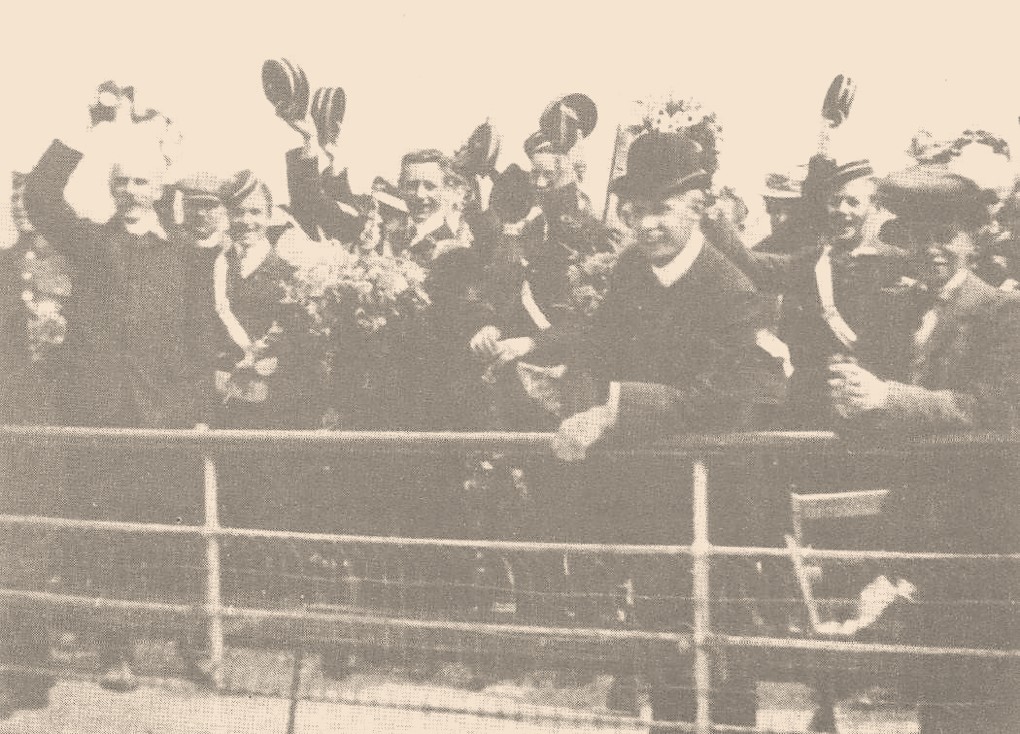
William Smith (left) with the 1st Glasgow Company returning home from the first camp in 1886.
Nothing could have been better than the behaviour of the boys in camp, and during the whole week not a single complaint of any kind was made against any one of them, while from all quarters the very highest testimony was borne to their admirable conduct. They entered into the work of the camp with a heartiness and goodwill which made It a pleasure to command them. The very strict discipline was maintained throughout, and we are sure that there was not a boy in camp who would not say that the camp was none the less, but all the more enjoyable on this account. That they did enjoy it to their hearts’ content, and will not forget It for many a long day, they themselves will be the first to testify, and we believe that their week of camp life has taught them that the highest pleasure and the greatest good for all is to be attained, not by each doing his own will, and following the bent of his own inclinations, but by each giving himself up for the good of others, and subordinating his will to the will of one in whom he can trust, and to whom he looks to lead and guide him, and plan out his daily life for him.
To the many kind friends who contributed in so many ways to make the camp a success, our most hearty thanks are due. And we cannot feel too grateful to the God of our camp, whose presence and guidance we asked for at the beginning, and continued to ask throughout, for the bountiful goodness with which He was pleased to crown our efforts to give our boys a healthy and happy holiday, and for enabling us to bring them all home safe and sound without a hitch or an accident of any kind.


